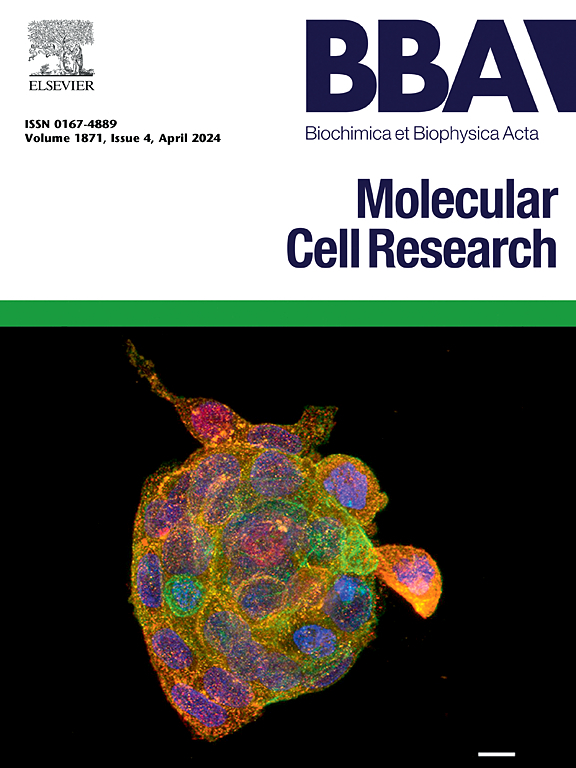RBM22-depletion delays progression through all steps of cell cycle and increases ploidy in myeloid cells
IF 3.7
2区 生物学
Q1 BIOCHEMISTRY & MOLECULAR BIOLOGY
Biochimica et biophysica acta. Molecular cell research
Pub Date : 2025-04-21
DOI:10.1016/j.bbamcr.2025.119965
引用次数: 0
Abstract
RNA-Binding Motif 22 (RBM22) is a splicing factor and a transcription regulator that plays important roles in cancer. Our goal was to document further the implication of RBM22 in cell cycle progression. Using normal human haematopoietic stem and progenitor cells and myeloid cell lines (MDS-L, HL-60), we demonstrated that RBM22 depletion reduces proliferation by delaying the progression of the G1-phase, S-phase and G2/M phase. RBM22 depletion alters mitosis, generating endomitosis and alters megakaryocyte differentiation. Altogether, we propose, for the first time, RBM22 as an essential actor of the cell cycle regulation in human haematopoietic stem and progenitor cells and myeloid cells. We demonstrated that RBM22 alteration is partially responsible for the phenotype of cytopenia of myeloid cell lineages observed in myelodysplastic syndromes (MDS) with a partial deletion of chromosome 5 (MDS with del(5q)) where one allele of RBM22 is lost. We hypothesise that the impact of RBM22 on cell cycle progression could explain some phenotypic features of other cancers.
rbm22耗竭延缓了细胞周期所有步骤的进展,并增加了髓细胞的倍性
RNA-Binding Motif 22 (RBM22)是一种剪接因子和转录调控因子,在肿瘤中发挥重要作用。我们的目标是进一步证明RBM22在细胞周期进程中的意义。利用正常人造血干细胞、祖细胞和骨髓细胞系(MDS-L、HL-60),我们证明RBM22的缺失通过延缓g1期、s期和G2/M期的进展来减少增殖。RBM22耗竭改变有丝分裂,产生有丝分裂并改变巨核细胞分化。总之,我们首次提出RBM22是人类造血干细胞、祖细胞和髓细胞细胞周期调控的重要参与者。我们证明,在5号染色体部分缺失的骨髓增生异常综合征(MDS with del(5q))中,RBM22的一个等位基因丢失,RBM22的改变部分负责髓系细胞减少的表型。我们假设RBM22对细胞周期进程的影响可以解释其他癌症的一些表型特征。
本文章由计算机程序翻译,如有差异,请以英文原文为准。
求助全文
约1分钟内获得全文
求助全文
来源期刊
CiteScore
10.00
自引率
2.00%
发文量
151
审稿时长
44 days
期刊介绍:
BBA Molecular Cell Research focuses on understanding the mechanisms of cellular processes at the molecular level. These include aspects of cellular signaling, signal transduction, cell cycle, apoptosis, intracellular trafficking, secretory and endocytic pathways, biogenesis of cell organelles, cytoskeletal structures, cellular interactions, cell/tissue differentiation and cellular enzymology. Also included are studies at the interface between Cell Biology and Biophysics which apply for example novel imaging methods for characterizing cellular processes.

 求助内容:
求助内容: 应助结果提醒方式:
应助结果提醒方式:


